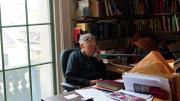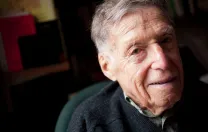1948 An Afternoon with Sinclair Lewis
April 16: Join Day Tuttle (Smith College theater department), who has planned a visit to South Williamstown to discuss dramatization of Kingsblood Royal. We arrive at “Thorvale” (large spacious white house inside 800 acres of hilly land at the base of the Taconic Trail).
Lewis asleep when we arrive. A Mrs. Powers, white-haired and alert, lets us in. We go into a large living room with a splendid view of Mt. Greylock and long running fields. Enter Lewis: tall and gangling, shuffling walk. Thin wisps of yellow-white hair, combed back, large red patch on the right side of his face, marked palsy. A copy of Anaïs Nin’s book on his living room table, shelves of records, a set of the Nonesuch Dickens. Lewis is proud of his house and obviously enjoys his possessions.
We take a walk through a beautiful birch grove. I ask him if Veblen had influenced him. (No, he’d never read him.) Mrs. Powers had whisky laid out for use on our return. Lewis, now a reluctant teetotaler, doesn’t enjoy watching others drink.
Yeats and Keats, his favorite poets.
Sherwood Anderson largely a fake. (I challenge him and compare Anderson to Whitman.) “Whitman is a ‘fake’ too,” he replies. Describes a mellow evening with Eugene Debs and Carl Sandburg in West Side Chicago, Debs—the romantic, the lovely soul—getting wildly high and describing how the railroad dicks would follow him from train to train, and how he could always spot them before inviting them to sit with his conductor and fireman friends near the stove to keep warm.
Some reminiscences of his father doctor, of Upton Sinclair and Helicon Hall; his dislike of Yale architecture; his fondness for the writers of the 1890s (Harold Frederic, Hamlin Garland); his son Wells Lewis (whom I knew at Harvard). Says he should have been a Methodist exhorter. Likes to win, enjoys violence and enthusiasms, distrusts silent people who have no strong likes and dislikes. Quickly called me Dan and said he’d remember “Aaron” since it was the first name of the hero in his next book—a historical novel about life in Minnesota in the 1840s (missionaries, Calvinism, etc.). He wants to visit Northampton and meet our friends and wives. Eager for more talk.
1952 The American Religious Experience
Note how the Baconian axiom “knowledge is power” becomes a hallmark in America: it sanctifies the pragmatic, the utilitarian. But our writers (Emerson, Thoreau, Whitman, Melville, Hawthorne, James) divide those who have “lived” from those immured in a “pig lead” world. Perhaps the chief value of the American religious heritage is its counter-materialism. Church and religion were bound to be tarnished by American materialism, to become at times adjuncts of business. Still, Christian doctrines have reminded Americans of something beyond hard realities. Jonathan Edwards attacked easy complacent virtues—the hypocrisy of the moral sense.
1953 On Learning
What joy to learn—more satisfying than love, yet all the better when pursued in the aura of love.
1953 The Difficulty of History
Matthew Paris: “The lot of historical writers is hard; for if they tell the truth they provoke men, and if they write [what] is false they offend God.”
1953 Truth Too Near the Heels
Sir Walter Raleigh: “Whosoever, in writing a modern history, shall follow truth too near the heels, it may haply strike out his teeth.”
Richard Hofstadter (Quoting Alain de Lille): “Authority has a nose of wax; it can be twisted in either direction.”
1964 Note for Our Times
March 5: News item: The police officer handcuffed to Oswald when Oswald was shot by Ruby declared today that he had been blinded by the lights from the TV cameras when he emerged with his prisoner. Therefore he could not see Ruby approaching Oswald with a drawn gun. (The light that obscures; the pitiless light of publicity. What a comment on our news agencies.)
1965 Transmissions from Gods and Devils
Norman Mailer’s The Presidential Papers is more interesting than An American Dream and certainly more real. NM is a Manichean, a comic Nietzsche, Charlie Chaplin. He wants to live his thoughts. God and the Devil speak to him, and he transmits their messages in the metaphors of violence, scatology, and the absurd.
1967 Young Folk
In 1967, it seems that all “activism”—Left, Right, and Center—is channeled into the mass media. Little is left to chance these days. No ideas are given time to incubate. How to avoid the TV channel, the magazine channel? Tom Hayden, one of the New Left participants, at YMHA. He’s described in the Hampshire Gazette as a “resident activist” in Antioch. The Establishment is all-embracing so that protest music, drugs, etc. immediately become “subjects” to be “presented” and, in the process, “de-fanged.”
1987 Terminal
Santayana: “There is no cure for birth or death save to enjoy the interval.”
2009 Petunias
At the end of Farwell Place, just as it turns into the walk that divides Christ Church from the Cambridge graveyard, you can see a clump of volunteer Petunias, tiny blue flowers modest and winsome. I think what a silly name for such lovely things. I check my dictionary. “Petunia” derives from the obsolete French word pétun (tobacco), which in turn comes from the Portuguese petum, which is based on a word in the language of the Tupi-Guarani (South American).
So my dislike of the word disappears.
1967 DA’s Obituary
D aniel Aaron
A rrived August 4, 1912
N amed after no one, in particular
I nvented nothing, except in words
E ven disposition
L oved a good deal and was loved
A nnounced early plans for old age
A ssisted various and sundry students
R etired at 65
O nce released
N ever heard of again
1970 Daniel’s Pomes
“Old Age”
When skin
Gets paper thin,
Scratches bleed.
I heed
These hints—
And wince.










